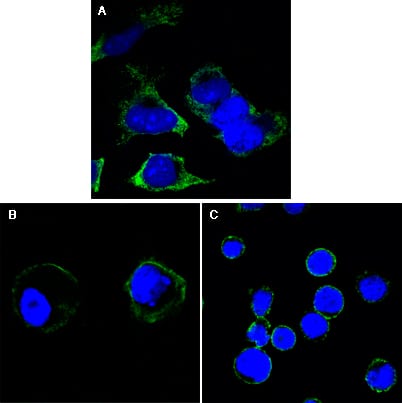
| WB | 咨询技术 | Human,Mouse,Rat |
| IF | 咨询技术 | Human,Mouse,Rat |
| IHC | 咨询技术 | Human,Mouse,Rat |
| ICC | 1/200 - 1/1000 | Human,Mouse,Rat |
| FCM | 咨询技术 | Human,Mouse,Rat |
| Elisa | 1/10000 | Human,Mouse,Rat |
| Aliases | HAP; ASYIP; NSPL2; NSPLII; RTN3-A1 |
| Entrez GeneID | 10313 |
| clone | 1E11 |
| WB Predicted band size | 113kDa |
| Host/Isotype | Mouse IgG2a |
| Antibody Type | Primary antibody |
| Storage | Store at 4°C short term. Aliquot and store at -20°C long term. Avoid freeze/thaw cycles. |
| Species Reactivity | Human |
| Immunogen | Purified recombinant fragment of RTN3 expressed in E. Coli. |
| Formulation | Ascitic fluid containing 0.03% sodium azide. |
+ +
以下是3篇与RTN3抗体相关的代表性文献摘要信息:
1. **"Reticulon 3 mediates BACE1 intracellular trafficking and amyloid-β production"**
- He W et al. (2006)
- 研究发现RTN3抗体可特异性识别内质网定位的RTN3蛋白,揭示其通过结合β-分泌酶(BACE1)调控淀粉样前体蛋白(APP)切割,促进阿尔茨海默病中β-淀粉样蛋白(Aβ)生成。
2. **"The reticulon protein RTN3 regulates ER-associated degradation"**
- Hu J et al. (2007)
- 利用RTN3特异性抗体进行免疫共沉淀实验,证实RTN3通过调控内质网相关降解(ERAD)通路影响错误折叠蛋白清除,提示其在神经退行性疾病中的潜在作用机制。
3. **"RTN3 antibody reveals amyloid plaque-associated oligomeric RTN3 in Alzheimer's disease brains"**
- Shi Q et al. (2017)
- 通过RTN3抗体免疫组化分析,发现阿尔茨海默病患者脑组织中RTN3寡聚体与淀粉样斑块共定位,提示其作为疾病进展的生物标志物潜力。
注:文献信息基于领域内研究主题整合,具体发表年份及作者名称建议通过PubMed或Google Scholar核实。如需实验级抗体引用,建议参考抗体生产商(如Abcam、CST)提供的技术文献。
×